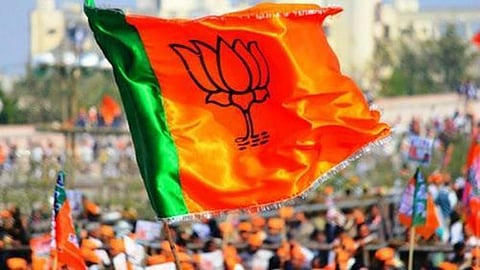
- Home
- Live Blog
- Breaking News
- Top Headlines
- Cities
- NE News
- Sentinel Media
- Sports
- Education
- Jobs

Our Correspondent
Itanagar: Political gain for the ruling BJP, controversial Citizenship Amendment Act (CAA) and Permanent Resident Certificate (PRC) issue along with development trajectory put by the state government kept Arunachal in news during 2019.
The year remained as a mix-bag of fortune for the saffron party as it came to power for the second term with thumping majority after political instability in the state since 2014.
The BJP’s lotus bloomed in 41 constituencies out of total 60 in the state during the April 11 elections, while the party also clinched both the Lok Sabha seats. The Pema Khandu government also had to face tough phases of protest in the state against Citizenship Amendment Act (CAA) and Permanent Resident Certificate (PRC) issue, a never seen situation before.
After a long period of political instability in the state, the BJP could form the government on its own while, the JD (U), which made its maiden entry into the electoral scene of Arunachal Pradesh, won seven seats and another debutant National People's Party (NPP) secured four seats.
Both the JD (U) and NPP being coalition partners of the NDA, extended their support to the ruling BJP in the state.
The lone regional outfit, Peoples' Party of Arunachal (PPA), bagged a single seat, while two constituencies went to independents.
In a facebook update immediately after the election, Chief Minister Pema Khandu said, “Will stand up to expectations of the people of the state. Good news is that we now have our own team of elected BJP members in the Assembly, our own team - the first elected BJP government in Arunachal. With 'double engine sarkar' - Modi govt in the centre and Pema government in Arunachal, its good days ahead!”
Arunachal Pradesh, known as the ‘Island of Peace’, witnessed violent protest during last part of February over the Permanent Resident Certificate (PRC) issue.
Protests erupted in Itanagar and adjoining Naharlagun in late February over the proposed grant of PRC to six non-Arunachal Pradesh Scheduled Tribe (APSTs) communities living in Namsai and Changlang districts and to the Gorkhas living in Vijaynagar in Changlang district.
Curfew clamped in Itanagar and Naharlagun town failed to deter protesters from venturing into the streets and pelting stones that left 35 people, including 24 police personnel, injured. While three people died in police firing during the protest.
The private residence of deputy chief minister Chowna Mein was set ablaze and the office of the Itanagar deputy commissioner ransacked.
Over 100 vehicles were also set ablaze by the protestors compelling the state government to close the issue and announced a judicial probe into the large scale rioting, violence and vandalism.
Protests against the amended Citizenship Act were witnessed across the state, with students' unions boycotting their examination to hit the streets across cities, seeking immediate revocation of the law.
Thousands of agitators, led by Rajiv Gandhi University Students’ Union (RGUSU) and Students' Union of NERIST (SUN), marched from the varsity to Raj Bhavan, covering a distance of around 30 km on the hilly terrain.
Local people, along with those belonging to the Assamese community, also joined the rally in Arunachal Pradesh to protest against the controversial law, most of them raising slogans against the BJP-led government at the Centre. The agitators submitted a memorandum to Governor Brig (retd) Dr BD Mishra, stressing that the amended Act would not be implemented in the state.
“We oppose the Citizenship Act and want its immediate revocation. The law will divide the region on religious lines and jeopardise the existence of the indigenous people,” the protesters claimed.
According to the amended Act, non-Muslim refugees, who escaped religious persecution in Pakistan, Bangladesh and Afghanistan and entered India before December 31, 2014, will be granted Indian citizenship.
It, however, exempted tribal areas of Assam, Meghalaya, Mizoram or Tripura as included in the Sixth Schedule of the Constitution and areas covered under The Inner Line (ILP) regime, notified under Bengal Eastern Frontier Regulation, 1873.
Currently, the ILP regime is applicable in Arunachal Pradesh, Nagaland, Mizoram and Manipur.
The protesters, however, claimed that Assam was the gateway of the northeast, and the region would suffer if the state gets affected.
The All Arunachal Pradesh Students’ Union (AAPSU) had made it clear that the people of the frontier state will not accept citizenship to Chakma and Hajong refugees at any cost.
AAPSU President Hawa Bagang said that citizenship to the Chakma-Hajong refugees will never be acceptable to the people of Arunachal Pradesh.
He also highlighted the atrocities committed by the refugees against the indigenous people and doubted the Centre’s sincerity in resolving the issue.
In the development front, the state witnessed implementation of various flagship programme and schemes of the Centre and the state.
During the year, security forces also intensified operations against underground groups active in the state, after suspected NSCN members gunned down sitting MLA and NPP assembly poll candidate Tirong Aboh and ten others, including his son and security personnel, in Tirap district on May 21 - just two days before the election results were announced.
Aboh (41), who had switched over to the NPP from the BJP after being denied a ticket, was seeking a re-election from Khonsa West assembly constituency.
The MLA was on his way to his constituency from Assam, along with family members, police personnel and a poll agent, when the suspected rebels opened fire on their vehicles near 12 Mile area in Tirap. Over the next few months, around 30 members belonging to various factions of the National Socialist Council of Nagaland (NSCN) were apprehended.